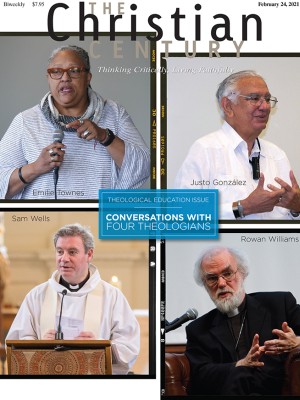This Lent, I want to learn to see the world like a poet
Why I’ve chosen Michele Madigan Somerville's Glamourous Life as my Lenten companion.

In the monastic Rule of St. Benedict, Lent is a time for reading. The Rule calls for each monk to receive a book from the monastery library at the beginning of the season and to read it cover to cover. Underscoring the importance of this practice, the Rule also assigns two senior monks to walk the halls, making sure that everyone is doing it.
Lent was also a time for reading in the church I grew up in, marked by a church-wide weekly Lenten Bible study. In spite of the staying power of an early slogan of our denomination—“No creed but Christ, no book but the Bible!”—I don’t remember reading the Bible during Lenten Bible study but rather books about Christian life. I wish I could remember the authors or the titles, but memory fails me. What I do remember is feeling grown up and part of something as I sat talking with others in a circle of folding chairs set up under the basketball hoop in the fellowship hall, a book on everybody’s lap.
Read our latest issue or browse back issues.
A book can be a good companion through Lent, whether we read in a group or alone. A book can be a guide through Lent’s wilderness, a source of courage along the road to Jerusalem, a ladder into the season’s depths and our own.
I’ve been wondering what to read this Lent, as we pass the one-year mark of our ongoing quarantine, mourn the staggering losses of this time, and try to find new ways forward in the wake of a dangerous and destructive presidency.
If you Google around about Lenten reading, you’ll find that many people read Dante’s Divine Comedy during this season. Dante’s middle volume, Purgatory, seems the most popular for this purpose. Often obscured by the baroque terrors of the Inferno and the dazzling light of Paradise, Purgatory is sometimes regarded, as my daughter puts it, as “the boring one.” But in the eternal scheme of things, Purgatory may be the least boring one of all because its subject is the possibility of change. The souls Dante encounters in purgatory are neither mired in everlasting torment nor circling in bliss. Their choices still matter. They are on a journey to become something new.
No wonder Purgatory is a popular choice for Lenten reading. For we are also on a journey by which we hope to be transformed. Dante’s journey through purgatory is marked by his relationship with his guide, the poet Virgil; his conversations with the dead; and the songs he hears along his penitential route—songs that draw him out of and beyond himself. Dante reminds us that the Lenten journey is not a solitary one but a journey alongside others whose guidance, stories, and songs will be a crucial part of our transformation.
As we feel our way forward in this season and in this time, poetry offers a light. Poetry is agile enough to focus our attention on the small and the hidden as well as to help us feel the sweeping rhythms of existence and the movement of history. We need both these days: a precise and loving attention to the world around us and a sense of ourselves as acting in history, making choices that matter.
The world is quietly overflowing with magnificent poetry by poets who hold our existence, in all its brokenness, up to every kind of light. One of my favorite new books of poetry is Glamourous Life by Michele Madigan Somerville, a poet I am lucky to know from her time as a student at my divinity school. I read Glamourous Life over Christmas, and I am going to make it my reading for Lent as well. Although it is a slim volume, it has an epic feel, beginning and ending with images of Cleopatra. In the first poem, Egypt’s ancient ruler surveys the “pulverized shebang” of history from the beginning to the present moment; in the last, Cleopatra soaks in her bath, turning the pages of a book (which seems, at times, to be one of Dante’s), savoring every syllable, “the doo-wop of the spheres.” And in between, poem after poem unfurls the glamorous life of the title—life in our bodies, life with children, life with lovers and friends, life with God.
Cleopatra looks out across history with a God’s-eye view, and she sees it all: the slaughter and the birthing, the creativity and the destruction. But the poet also brings her lens in close to delight in the sacredness in which we are yet awash, in spite of everything. With her capacious vision, she illuminates the patterns that crisscross our lives, the systems and repetitions in which we’re caught, and the avenues of escape.
The cascading words, images, music, and liturgy of Somerville’s poems made me consider my own glamorous, messy, embodied life. By illuminating the places where the sacred lies hidden in plain sight all around us, she challenged me to remember that, in every moment, we choose where to put our energy, to what to devote our loyalty, with whom we will stand. This Lent, I want to learn to see the world like a poet, the smallest gestures shining with meaning and consequence, their significance visible within the largest shifts. Like Somerville’s Cleopatra turning “a soggy page,” I will try not to let a syllable go to waste.
A version of this article appears in the print edition under the title “My companion this Lent.”






